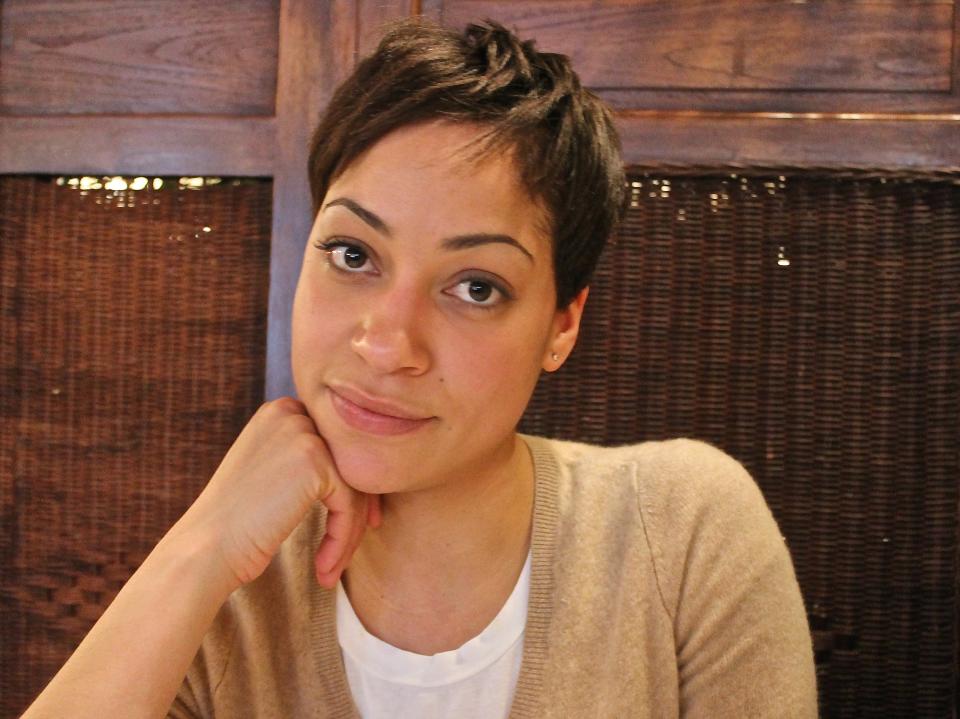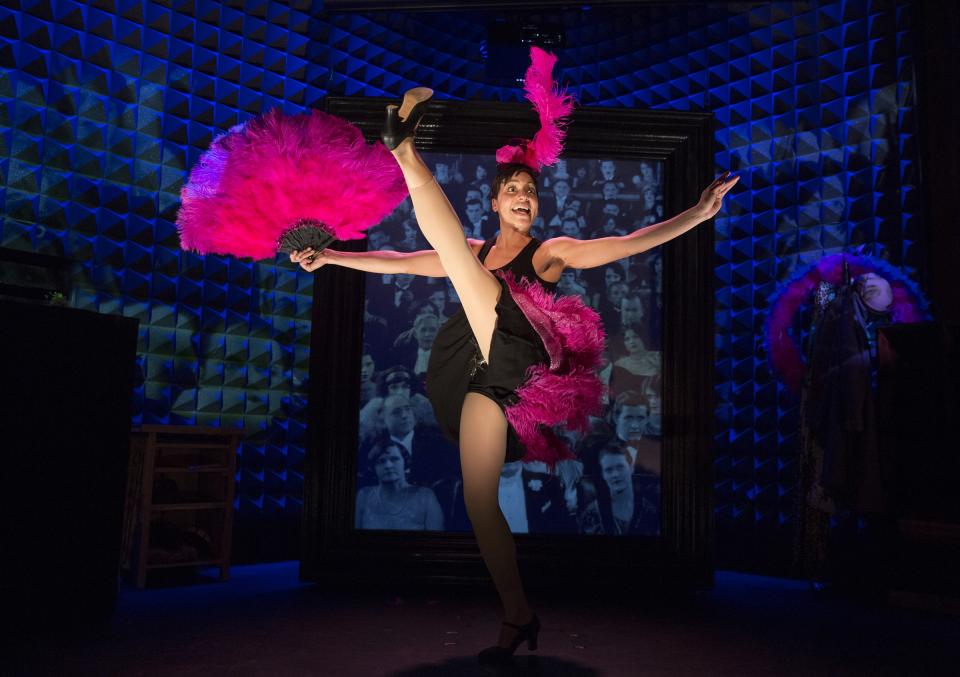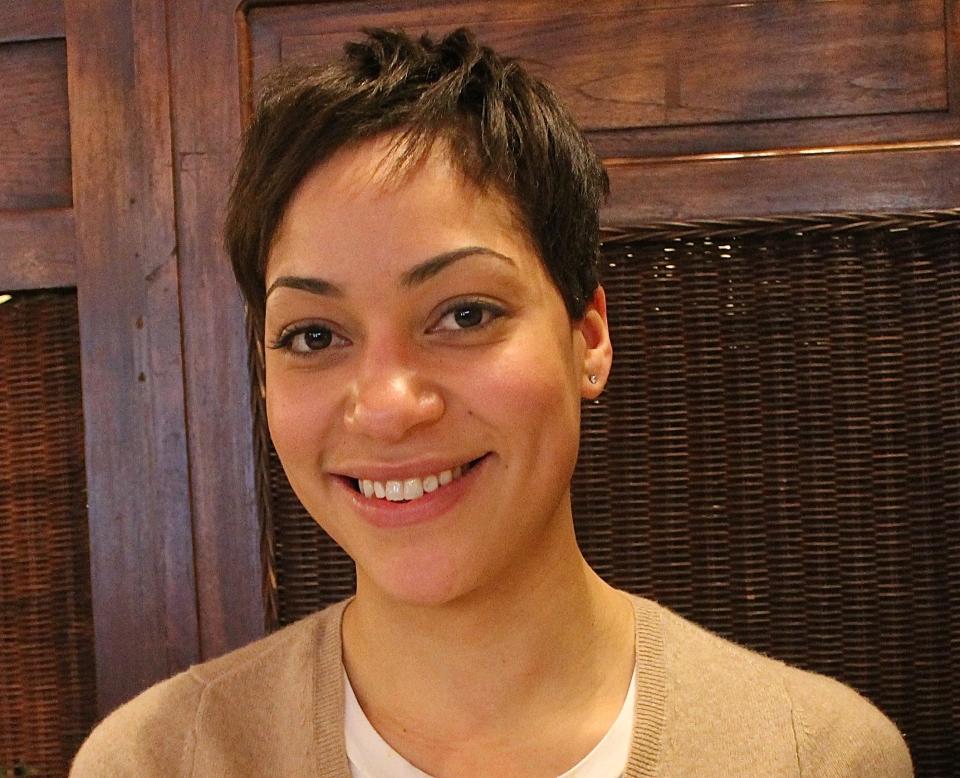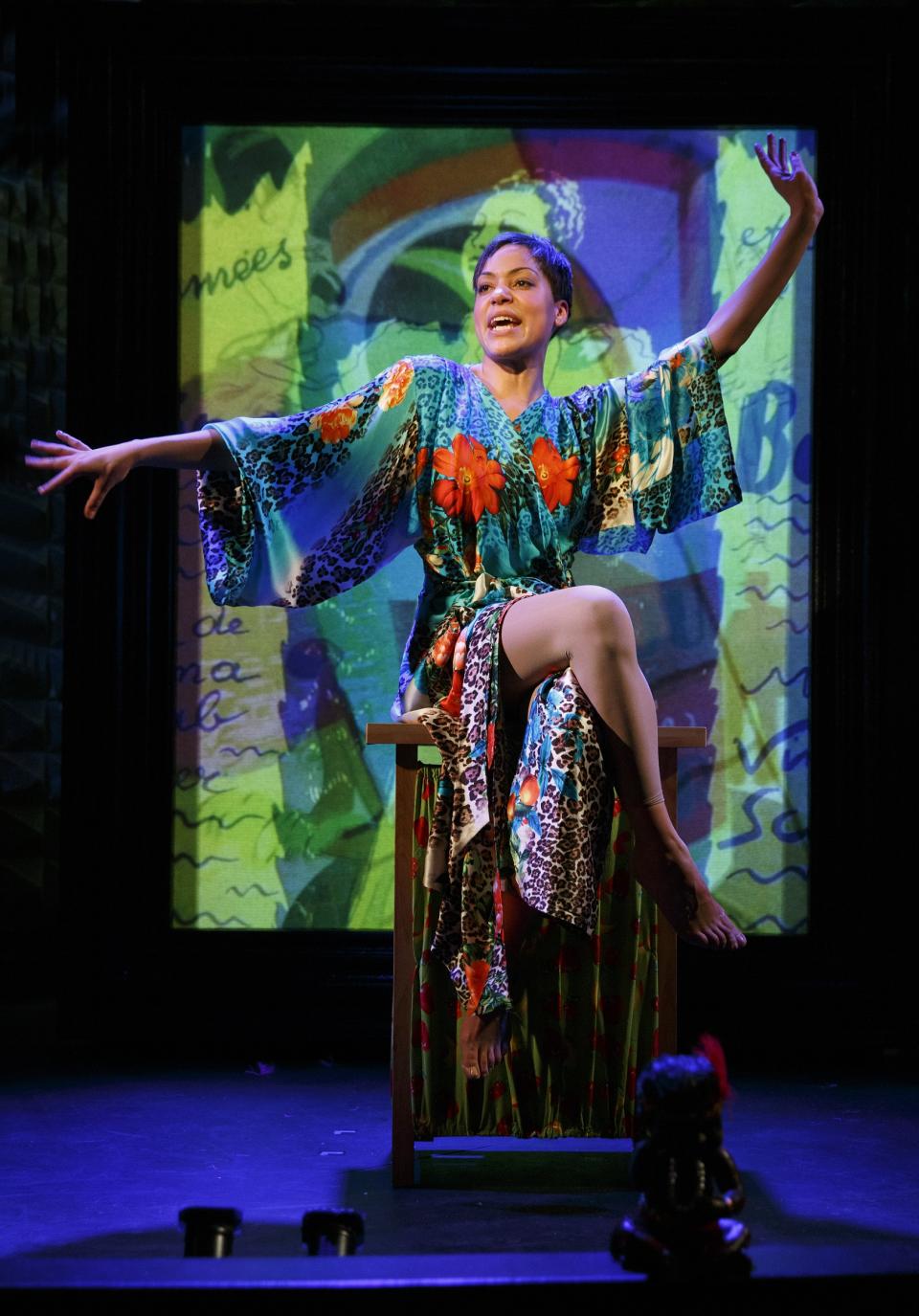Exit Hugh Jackman, Enter Josephine Baker: Cush Jumbo’s Changing Times

One of the many things I never knew until I saw Cush Jumbo’s show Josephine And I is that Josephine Baker sang Bob Dylan’s “The Times They Are A Changin'” at Carnegie Hall in a triumphant 1973 concert. She didn’t shed her clothes, shake a banana skirt or summon African spirits. She sang the song with smoldering fury, ending every verse, “For the times they are a-change…changin’”
You can watch Baker on the video here, and if you’re lucky enough to catch one of the last few performances of the astonishing Josephine And I this week in Joe’s Pub at the Public Theater, you can see Jumbo’s haunted reprise of that 42-year-old performance. It’s the culmination and climax of the one-woman show she’s been running like a 90-minute marathon ever since her equally acclaimed Broadway run — opposite Hugh Jackman in The River — ended in February. That was a 90-minute show as well, but she shared the stage with Jackman and actress Laura Donnelly. While plenty of eyes were glued to the Wolverine, it was Jumbo who stole the show as his amiable but increasingly unsettled girlfriend over a Twilight Zone-y weekend trip into the woods.
Josephine And I interweaves two stories: of the black singer and dancer from St. Louis who found love and adoration on the stages of Paris and around the world after escaping the suffocating humiliation of race hate in her home country; and of a mixed-race girl reared in London, star-struck and startled into an ecstasy of recognition when she first sees a film clip of Baker in the 1934 French movie Zouzou, moving her to tear round the house calling to her mother about the movie star who looked like her and wasn’t a maid.
Jumbo is entrancing as Baker, loose-limbed and comically endearing as one-time Broadway hoofer Lucille Ball, yet soulful and mysterious, too, and touched with mischief: I met her for lunch at a fancy East Side restaurant, where she arrived with her toy poodle, who spent the meal happily oblivious of the maitre d’s whispered warning that our food might be delayed because city inspectors were on the premises. The “I” in Josephine grows up to become a hardworking actress conversant in the classics — Jumbo played Marc Antony in Phyllida Lloyd’s scorching all-female, prison-based production of Julius Caesar last year at St. Ann’s Warehouse in Brooklyn — and also in the easy slings of bigotry afforded by the internet, changing times or no changing times.
Her film work includes the forthcoming Remainder, with Tom Sturridge and she will soon return to London to begin filming City Of Tiny Lights for director Pete Travis (Dredd, Vantage Point). She has also gained attention starring opposite Brenda Blethyn in the British detective series Vera.
DEADLINE: What happens after Josephine And I?

CUSH JUMBO:
London is my home, where my stuff is, but I’m always living out of a suitcase. I’ve been here for six months, we finished The River and I should’ve had two days off, but instead I did a movie workshop. And then I did this. I’m not complaining, but it’s nice to have a bit of headspace time.
DEADLINE: How did The River come about?
CUSH JUMBO: I did three auditions. The third one was with Hugh, the first two I didn’t know who the star was. Then I had to wait for four weeks while they came here and auditioned a load of other girls, including Oscar-nominated actresses, and wait to hear whether or not I had it, and I just assumed I didn’t. But I did.
DEADLINE: Was it intimidating when you found out who the lead actor was?
CUSH JUMBO: I found out who it was a few hours before I went in to see him. I remember having a proper tizz at home. I told him this later because we’re good mates now. It seems so ridiculous, but I had a proper tizz at home. Not just a tizz, a proper tizz.
DEADLINE: And he completely put you at your ease, right?
CUSH JUMBO: He has this absolute way about him. He does something that I think is really hard to find now with male actors, especially when they’re quite well known, which is to be in a scene with somebody and make them feel like what the person is saying is far more interesting than what they’re about to say. It’s very unusual for men, and that’s coming from a woman who’s always happy to bounce off other men.
DEADLINE: I guess I need to ask about your name. It is your real name, yes?
CUSH JUMBO: You try and make that up. I grew into it. My parents are very interested in Egyptology, the connections between Africa and what names mean. I’m the second of seven children, so I was always going to be deputy in the lineup of the kids. My dad was convinced I was a boy. So they were looking for boys’ names. A small part of Egypt was called The Cush.
DEADLINE: Your father’s Nigerian?
CUSH JUMBO: Yeah, and my mom is from Yorkshire, but they’ve both lived in London for over 30 years now.
DEADLINE: And where did your, let’s call it fascination with Josephine Baker come from?

CUSH JUMBO:
Around age eight or nine, I became aware of her. On Sunday afternoons, they always used to put on Musical Madness on Channel Four, and she popped up a couple of times. Of course it instantly struck me that it wasn’t so much that we were identical looking, it was that I knew that she was brown, and my brain couldn’t make the connection between the being a star and being brown. I think I just got very excited because I was always pretending to be a star. It’s like a running joke in my house. Where’s Cush? Oh, Cush is in her boudoir pretending to be a star.
I had no idea 20 years later I was going to write a show about her, but that’s when it first went in. I love both of my sides, but I’d always felt, well, I’m half white, so I’m halfway there, but no one’s ever going to see me as white. I don’t look white, but you identified being the best and the most beautiful with being that color. I was doing a series in Scotland, and I’d just had enough. It was boring. The story was horrible. The writing was horrible. And that’s when I realized that acting meant more to me than just making the money. I was so blue about it. I thought I’ve not been waiting my whole life to do this job so that it could become a 9 to 5 in an office. I had lost all my confidence. I called my mum and she was like, “You know, you used to write a lot of little different bits and pieces. Maybe you should write. And I thought, Yeah, she’s right. And that’s when I started writing the show.
DEADLINE: We know who Josephine is. Who is ‘I’?

CUSH JUMBO:
I’d say she is 70 percent me, and most of the stories that I talk about in the show are things that’ve happened to me. And anything that hasn’t happened to me has happened to someone I’ve been on set with or I’ve been with or witnessed it, but most of it’s me.
DEADLINE: There’s a horrific section in which you recite an unbelievably racist attack on your performance that was published in The Observer.
CUSH JUMBO: Completely true. It was an online comment. That was a big piece they did, and of course, my mom being my mom, Googles me every single day, I’m like Don’t Google me, you’ll see something you don’t want to see! It’s not that I didn’t take it seriously, but I live in the world. You have to take the rough with the smooth, and there are lots of nutters out there who sit in rooms and comment. But of course, to my mom — my mom and dad found it difficult to walk down the street together in the ‘80s and not have people make comments. So when she reads something like that about me 30 years later, she feels it deeply because she feels that, well, we haven’t moved. Whereas I feel like the fact that I’m doing that part means we have moved, but we still have some issues.
DEADLINE: But there’s another story about an opening night, when a white actress tells you sweetly, just before you’re about to go on stage, about Hattie McDaniel winning an Oscar — and dying in poverty.
CUSH JUMBO: I was doing Pygmalion in Manchester, and that actress came in and said what she said. It’s like being hit by a car. You’re so excited to have them there that you don’t see it coming at all, and then as she left, I realized what she’d done, and she’d done it minutes before I went on for opening night. She’d picked that exact moment, undercover and premeditated. If someone just screams n**ger at you and they’re out in an audience, you just think, OK, it’s spontneous, it happens. But when people are, “I’m just going to let you know, 20-year-old girl up here by yourself, that this won’t continue. See all this? It’s a novelty.” I think nobody wants that to happen to their child. I just try to remind myself that people like that will be dead soon, and someone’s got to fill the void, you know?
DEADLINE: Nudity on stage was part of Baker’s persona. Did you consider going that far?

CUSH JUMBO:
I can’t recreate that feeling of being naked, because we’re all so used to seeing each other’s tits and ass-cracks that all that’s going to give you is Cush dancing half-naked in a banana skirt. We were trying to find a way to give people a percentage of that feeling, and the nearest way we could find to do it was to involve music, and projection, and words in this summoning of something, because that’s how I wanted people to feel. When you begin to find out more about her and you see how much more there is, suddenly dancing topless in a banana skirt is like Julia Roberts doing adverts in her teens. It becomes insignificant compared to what it meant. It was Paris. So that’s what I was trying to do. But just for the record, I have absolutely no problem getting my tits out. People can’t stop me sometimes.
DEADLINE: Of course you know that we’re not far from Chez Josephine, the Theater District bistro run by Jean-Claude Baker, one of her many adopted children. Jean-Claude died just around the time you began doing Josephine And I. Did he know about the show?
CUSH JUMBO: He did. He never got to come see it at the Bush in London, but he knew it was coming here, and I was very excited about him coming to the show. And then he passed away two weeks before we opened. It was very weird. I felt like the only person who probably knows more about her than I do had gone. Every night I hold up a doll and say “Jean-Claude,” even though he’s not actually that baby, because he came along a bit later. He gets a cheer. It’s amazing and very sweet. It’s nice for him. He and Josephine are kind of in there, you know?
Related stories
Get more from Deadline.com: Follow us on Twitter, Facebook, Newsletter

 Yahoo Movies
Yahoo Movies 
